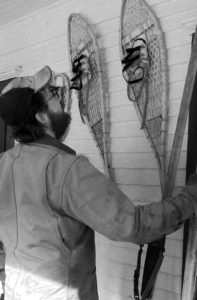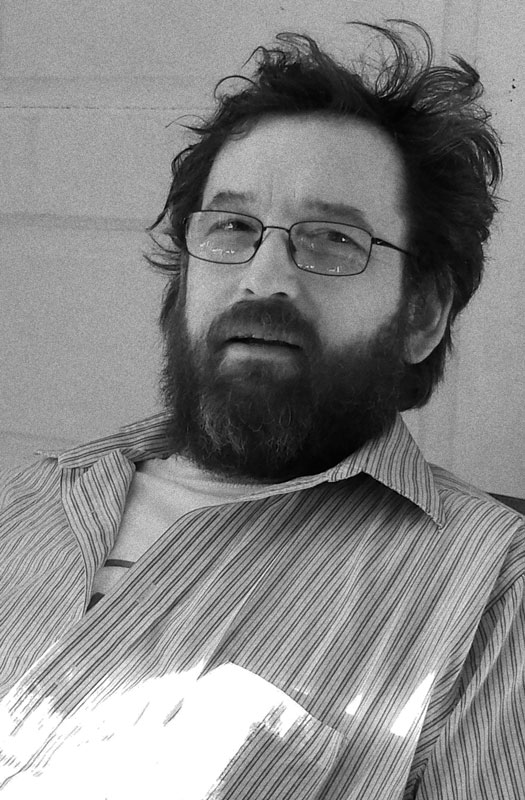My neighbor voted for Trump, and I still like him
Morning sunlight streams into Sven Bondeson’s cheery yellow kitchen, and he sprawls comfortably in his chair, nursing a cup of strong, black coffee. Outside, the temperature has barely risen above zero. Tall snowbanks crowd the house, and his young herding dog perches on one, peering in at us with curiosity. The walls are hung here and there with Swedish art and craft. A wood fire warms the house.
Sven is 100% Swedish—his ancestors on both sides were among the first to settle this part of Northern Maine in the 1870s. And right now he’s talking about the Vikings, telling me how they sailed as far as North America (which I knew), and Turkey (which I didn’t). I ask how he knows these things. He shrugs.
“I read,” he says with a grin. “Winters are long and cold.”
 Winters are long and cold in New Sweden, and Sven isn’t the only self-educated farmer I know. I came here 14 years ago, fresh from a Master’s program in Boston, with a chip on my shoulder. It took very little time for me to understand that small town doesn’t mean small mind.
Winters are long and cold in New Sweden, and Sven isn’t the only self-educated farmer I know. I came here 14 years ago, fresh from a Master’s program in Boston, with a chip on my shoulder. It took very little time for me to understand that small town doesn’t mean small mind.
New Sweden, Maine, population 602, sits fairly centrally in Aroostook County, Maine’s largest and most Northern county. Facing westerly out-migration following the Civil War, Maine Governor Joshua L. Chamberlain supported a plan to recruit Swedes to build an agricultural settlement in this wild, rugged, heavily forested part of the state. In 1870, the first 51 Swedish settlers, among them Sven’s great great great grandmother, arrived.
They and the waves of Swedes who followed built a Swedish colony in northern Maine, which grew and thrived right into the middle of the 20th century. Since the closure of Loring Air Force Base in nearby Limestone in the mid-1990s, New Sweden, like the rest of Aroostook County, has experienced steady economic and demographic decline.
The lack of opportunity leads to out-migration, which further reduces opportunity, in a heartbreaking downward spiral. Aroostook County experienced population change of -4.51% between 2010 and 2015, as compared to the more urban southernmost counties, where growth was as high as 2.95% in the same period.
“Our biggest issue, and it’s countywide, is that everyone leaves,” Sven says. “They go to Portland, or Boston, or wherever.” Sven is pragmatic, but not hopeful. “But this has been happening forever, so I don’t know that there’s a fix.”
 A few people still manage to make a living from the woods industry, though that’s fading. Others work at the hospitals in Caribou and Presque Isle. I serve as the deputy town clerk a few hours each month, and I write. Sven farms organic potatoes and vegetables, which he delivers bi-weekly up and down the state.
A few people still manage to make a living from the woods industry, though that’s fading. Others work at the hospitals in Caribou and Presque Isle. I serve as the deputy town clerk a few hours each month, and I write. Sven farms organic potatoes and vegetables, which he delivers bi-weekly up and down the state.
Today, Sven and I are talking politics, something we’ve never really done before. You can’t miss the enormous Trump sign on the side of his barn. Nor do most people fail to see the liberal bleeding heart on my sleeve. And yet, as far as it goes, I like Sven, and I don’t think he dislikes me. Still, through meetings of the Board of Selectmen, chance encounters at the local store, passings on the road, we’ve discussed school sustainability, basketball, weather, sheep and pigs—never political affiliation.
Sven calls himself a fiscal conservative, a Green Libertarian. Despite the differences in our political views, he puts into words what I’ve felt over the last year or so, living through politically polarized times in a community in which the majority of my neighbors voted “Red.”
“People aren’t that far apart, really,” he says. “I mean, there’s certain issues where they are maybe, but I think in general people aren’t as far apart as the media makes you believe.”
I keep reading articles and Facebook statuses, hearing NPR interviews that highlight over and over how many people only interact with others with similar political beliefs. Democrats cannot wrap their heads around Trump’s victory. Republicans cannot fathom support for Hillary Clinton.
I don’t have the luxury of that ignorance. Every day brings me into contact with people who think differently than I do. The most shocking thing to me is how many shades of red and blue really exist. Like Sven’s Green Libertarianism. In New Sweden, registered Republicans outnumber registered Democrats. But the largest political party in New Sweden, if it was a party, is Unenrolled.
Unenrolled is the unaffiliated category in which the state of Maine dumps all voters who do not choose a political party when they register to vote. Unenrolled is comprised of those who lean left, right, and center, libertarians, nonconformists, political apathists, those who prefer to make up their own minds, young people who aren’t yet sure what they believe, and almost any other category of voter you can imagine. Like the state of Maine, which has twice elected Independent governors (James Longley, who held office from 1975-1979, and now-Senator Angus King, 1995-2003), the Unenrolled dislike having their beliefs and values dictated by Party officials.
In colonial times, New England towns grew clustered around a Town Common, a patch of land held by the town, with access to all residents. If New Sweden ever had a Town Common, it has long since disappeared. But the approximately 40% of New Sweden voters who are “Unenrolled” stands as proof that, like Sven says, we aren’t as far apart as we might think we are.
Unenrolled is the common ground on which we meet. Unenrolled passes the town budget. Unenrolled hires an Animal Control Officer. Unenrolled attends the St. Lucia celebration at the school each December. Unenrolled works together to hold back the rushing tide of diminishing population and rising property taxes.
Sven is currently serving his second three year term as a Selectman in New Sweden, though his motivation for seeking that office is largely as party-less as his self-proclaimed political affiliation.
“I guess I ran for Selectman to try to stop people from doing dumb shit,” he says with a laugh. “It’s not like you can really fix anything, and you can’t really change much. But I was watching Selectmen, and they didn’t know what they were doing any more than I do. If you’re going to do something, at least find out why. Ask some questions. Understand what you’re voting on.”

Sven makes no bones about having voted for Trump, though his initial choice had been Rand Paul. Much of his impetus stems from being what he calls an “ABC voter”—Anyone But Clinton. But that’s not the extent of it. The independent mindset that characterizes so many New Sweden voters played a huge part also.
“I’m tired of Clintons, Bushes, Kennedys,” he says. “We’re not England, with a king and queen. Not that Trump is the perfect president, probably, but he’s a change. And the reality is, probably day to day, who’s in office doesn’t change my world much.”
And despite myself, I have to agree with him. I hear the news, I read the articles and editorials, and when I think about it, I can’t avoid the sense of impending doom in these next four years. But here, on a daily basis, Washington really is 800 miles away. I ask Sven what matters to him here, and his list is pretty similar to mine, and likely to all of our neighbors: roads, education, keeping people in town and growing business, preserving what we do have, keeping property taxes affordable.
We’re not that far apart.
Yet I know with certainty that if we lived almost anywhere else—anywhere bigger, more urban—Sven and I would likely never speak, forget about sitting down to wade together through the murky waters of politics. That forced connection, that sense of everyone being your neighbor, that constant putting one foot in front of the other to survive weather, financial hardship, influences of outside forces—that’s why I stay here, where I might sound to outsiders like a lone progressive voice in a conservative wilderness.
Though he travelled and lived in Massachusetts for a few years after high school, the majority of Sven’s 42 years have been spent in New Sweden.
“If you break down on the side of the road here,” he says, “someone’s always going to stop and help. That kind of thing translates throughout. Someone’s always going to give a hand. But I have a feeling most small towns are like that.”
Sven pours us both another cup of coffee.
Kasey Grieco McNeally lives in northern Maine, where she is active in her community and raises two young sons. She has taught writing and literature at Emerson College, Northern Maine Community College, and the University of Maine at Presque Isle. Her writing has appeared in The Forecaster, The Times Record, Portland Magazine, The MacGuffin, and Echoes. She’s currently the Deputy Town Clerk for the town of New Sweden.

